Ben Hogan PTx Tour Combo Irons Life-Tested Review
An iconic iron in a combo set with a dose of forgiveness? We had to try Ben Hogan's PTx Tour irons!
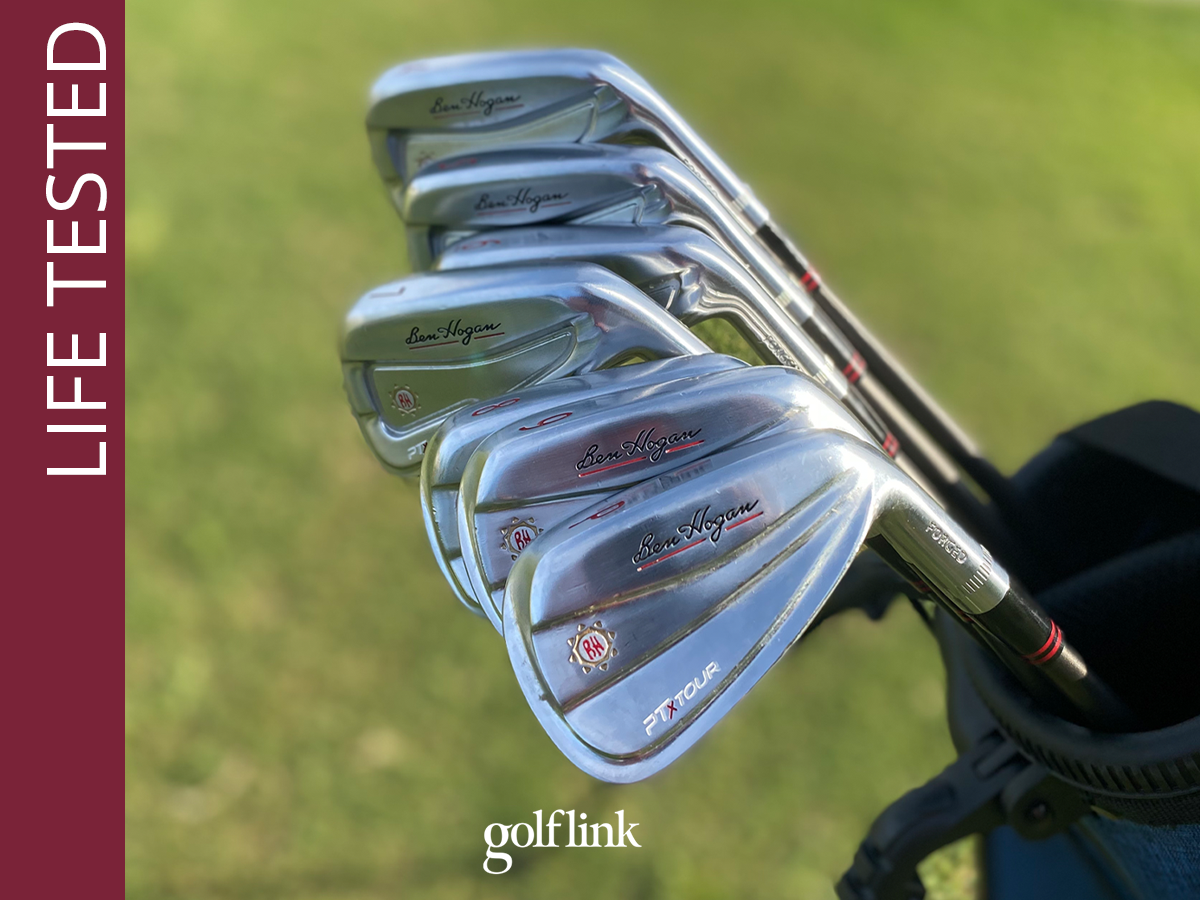
There’s a new set of Ben Hogan irons on the block, and low-to-mid-handicap players who love feel, style, and even some forgiveness, should give this combo set a serious look. After weeks with the new Ben Hogan PTx Tour irons in the bag, here’s our life-tested review.
Ben Hogan PTx Tour Irons Overview
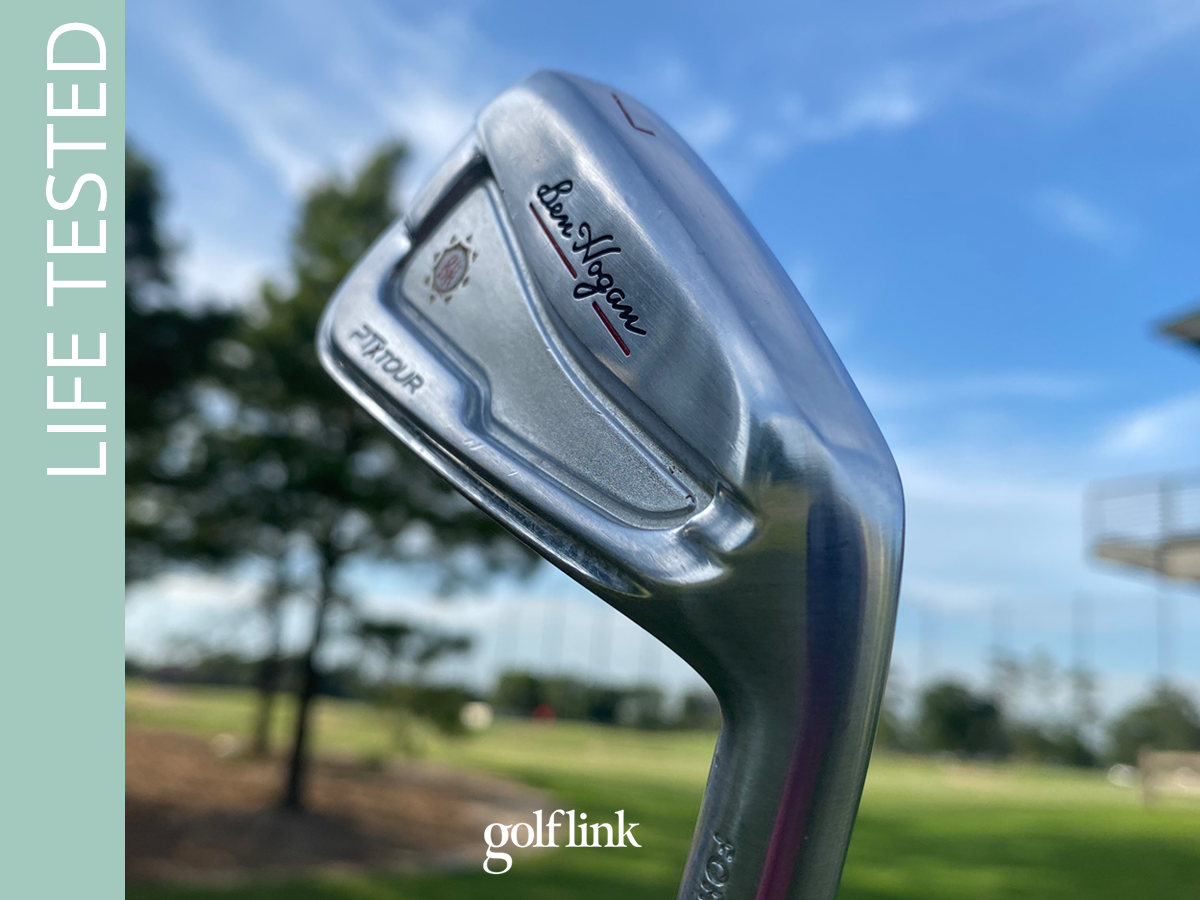
Find at Ben Hogan
Price: $999 ($649 heads only)
Set Make-Up: 4-PW
Lofts (4/7/PW): 21.5/33.5/45.5
Shaft Options: UST Recoil, Dynamic Gold, KBS Tour: Most Flex, Regular, Stiff, Stiff, Extra Stiff
Profile: Combo - Players Distance in Long/Mid Irons, Blade-like in 9-iron/PW. Ideal for low-handicap players or golfers trending toward single-digit
Pros:
- Gorgeous looks and design, harkening back Hogan golf equipment's roots
- Lots of customization options, including shaft type, flex, and length, lie, and grips
- Combo concept provides forgiveness in long irons, precision in short irons
- Super solid, soft feel throughout the set, especially with short and mid-irons
- Option to purchase heads only
- Demo program provides opportunity to try before you buy
Cons:
- Only available online for now, though company plans to employ network of club fitters in the future
- If you need a true game-improvement club, the Hogan PTx pros probably aren't for you
- Right-handed only
As first impressions go, the new Ben Hogan PTx Tour irons make a great one. Simply put, they are beautiful, just like the classic Hogan blades from a few decades ago.
I can appreciate that since I played Hogan Apex blades back in the late 1990s, and more recently have owned sets of the Hogan Icon and PTx Pro irons from Hogan’s previous owners. But this version, the PTx Tour, is about as eye-catching as any set the company has ever produced.
After putting these in the bag for the last couple of weeks or so, they've been noticed. Other players have asked me about them, wondering if the Ben Hogan Co., is still in, or back in business, or if these are just older irons in incredibly great shape.
My answer, of course, was that Hogan is back. Ben Hogan is now owned by Golf Brands Inc., a private company with U.S. headquarters in Henderson, Nev., just outside of Las Vegas. The company also claimed some other iconic brands of the past, such as MacGregor, RAM, and Zebra Golf.
Hogan is sold online only – direct to consumer – though the company is looking to set up a network of clubfitters. In the meantime, if you've been fitted before and generally know your specs, you can probably put together a pretty good set.
That's what I did, and I was fairly pleased with the way the clubs seem to fit my profile and tendencies. Plus, there's also a demo program where you can try before you buy for a small fee.
Some History of Ben Hogan Golf
The company, of course, was started by the great Ben Hogan himself in 1953. He sold the company to AMF in 1960, and it changed hands a few more times before Spalding bought the company in 1997.
These were some of the best years, but Spalding declared bankruptcy in 2003, and Hogan was acquired by Callaway, which did little with it (except put Hogan’s Apex line under the Callaway badge) until it sold the company to Perry Ellis in 2012. A couple more companies owned Ben Hogan over the next decade – each ending with bankruptcies – until Golf Brands Inc., resurrected Hogan a couple of years ago. It's a niche brand, and the current group aims to keep it that way.
The 1999 Hogan Apex blades I owned were the most beautiful and perhaps the best-feeling irons I ever played. But they weren't that forgiving. I was just a better (and much younger) player back then.
These new PTx Tour irons certainly remind me of those Apex blades, but unlike those clubs, the PTx Tours do offer some game-improvement features. They are also significantly different from the PTx Pro irons, which are still offered in a new version.
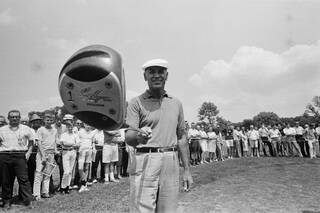
The History of Ben Hogan Golf Clubs
Ben Hogan PTx Pro vs. PTx Tour
The new PTx Pro irons are an improved version of the PTx Pros that were first offered in 2016. These retail for $770 for a 4-PW set, compared to $999 for the new PTx Tour irons.
The Pros are made with a multi-step forging process as well as multi-materials, but still have a seamless look to them. The 4-7 irons are hollow to help with distance and forgiveness, while the 8-PW have lightweight titanium face inserts designed to help bring down ball flight. I had the older set of these, and was quite happy with their overall performance.
That said, the PTx Tour irons are better. They seem to go longer, but most importantly, for me, they feel better and perform better. That's because these really are a combo set, though you probably wouldn't know that at first glance.
The biggest difference visually between the Tour and the Pro irons is in the 9-iron and wedge. The Tours are one-piece forged from 1025 carbon steel. They look like blades with a thin top line, modest V-soles, and muscle back appearance.
For me, these are the clubs that really remind me of the old Apex blades. And when you have one of these in your hands on a short approach shot, you feel confident that you can dial in a good shot.
To me, this is where the Tours shine, but the next two longer clubs – the 7- and 8-iron – have a three-piece design (though you can't see it). The face has a titanium insert for more forgiveness which moves weight higher to keep shots from ballooning.
The 6-iron is also constructed with three pieces and bridges the 7-PW and the long 4 and 5 irons. That 6 iron does not have the tungsten weighting found in the long irons, where you will see and feel a decent measure of forgiveness.
The 4- and 5-irons employ a four-piece construction. The inside of the heads are foam-filled (much like some other popular irons from other major manufacturers) and have tungsten weights low in the clubhead to help you get the ball up in the air easily.
I found this new design to be more forgiving than the long irons in my older versions of the PTx Pros.
Distance, Launch & Spin
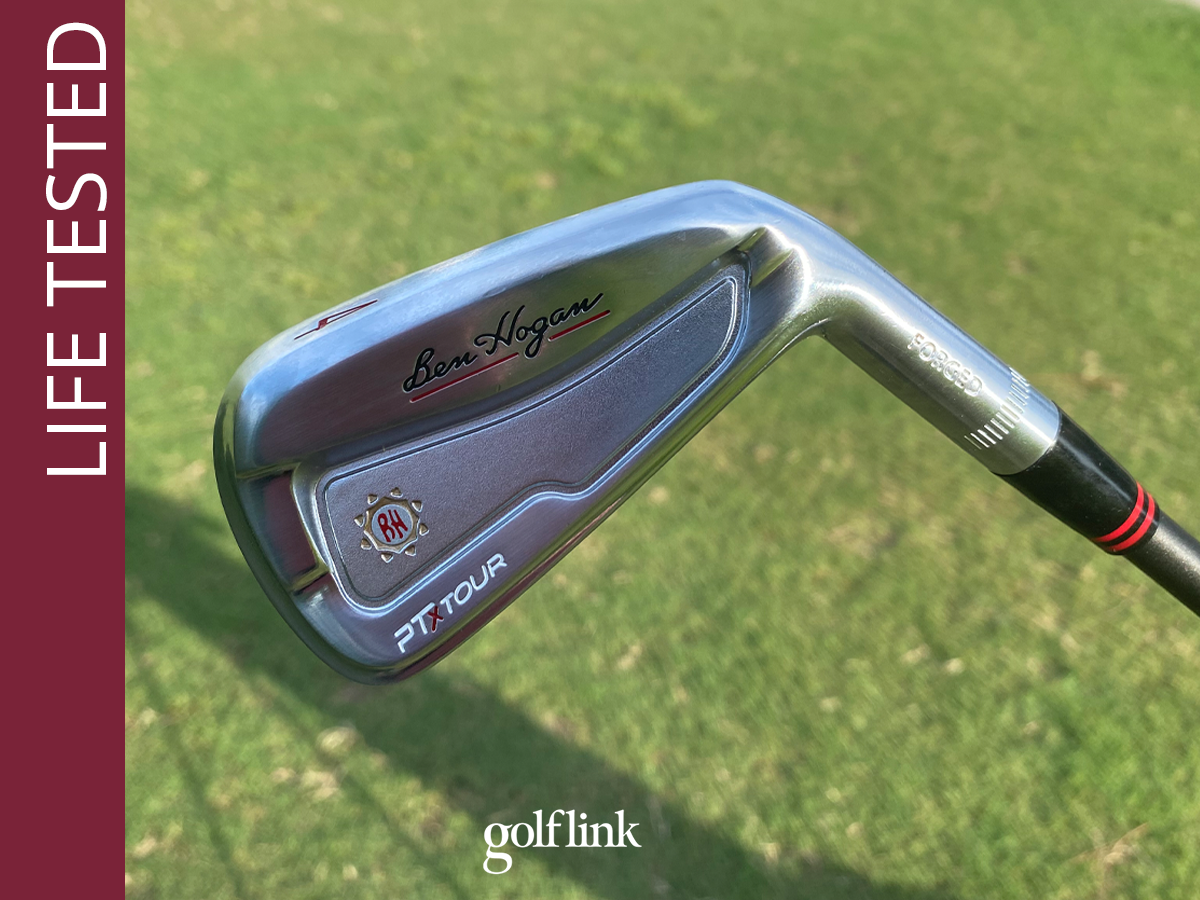
As for distance, the PTx Tour’s lofts aren’t as strong as the modern lofts of many other manufacturers, so if you’re comparing 7-iron to 7-iron, these might come up a touch shorter in a head-to-head comparison.
For example, I found that my 7-iron distance, which ranges from about 160-165 yards with the Gen 4 Players irons from PXG at 32 degrees of loft, was around 157-162 yards with the Hogan PTx Tour (33.5 degrees).
I found spin rates to be comparable to most other major manufacturers' irons (7-iron average was 159 yards of carry, 18-degree launch angle, and a spin rate of around 3,700 rpm). Of course, it's not robot testing, just a launch monitor on my own flawed swing.
More importantly, however, was how they performed on the golf course.
What I can report is any approach I hit with these clubs, especially 6-irons or shorter, held the greens easily. Short irons even backed up a little, which matches the performance I would expect from most of the clubs I've played and tested over the years. The biggest difference is how these felt, which was comparable to forged blades I've played in the past, except a lot more forgiving.
Forgiveness & Accuracy
While these PTx Tour irons are forgiving compared to Hogan blades of generations ago, I wouldn't recommend a set of these for a high-handicap player – they're not that forgiving – but I can see players up to a 15-handicap appreciating the craftsmanship and feel of these irons, especially if their game is trending in the right direction.
Look & Feel
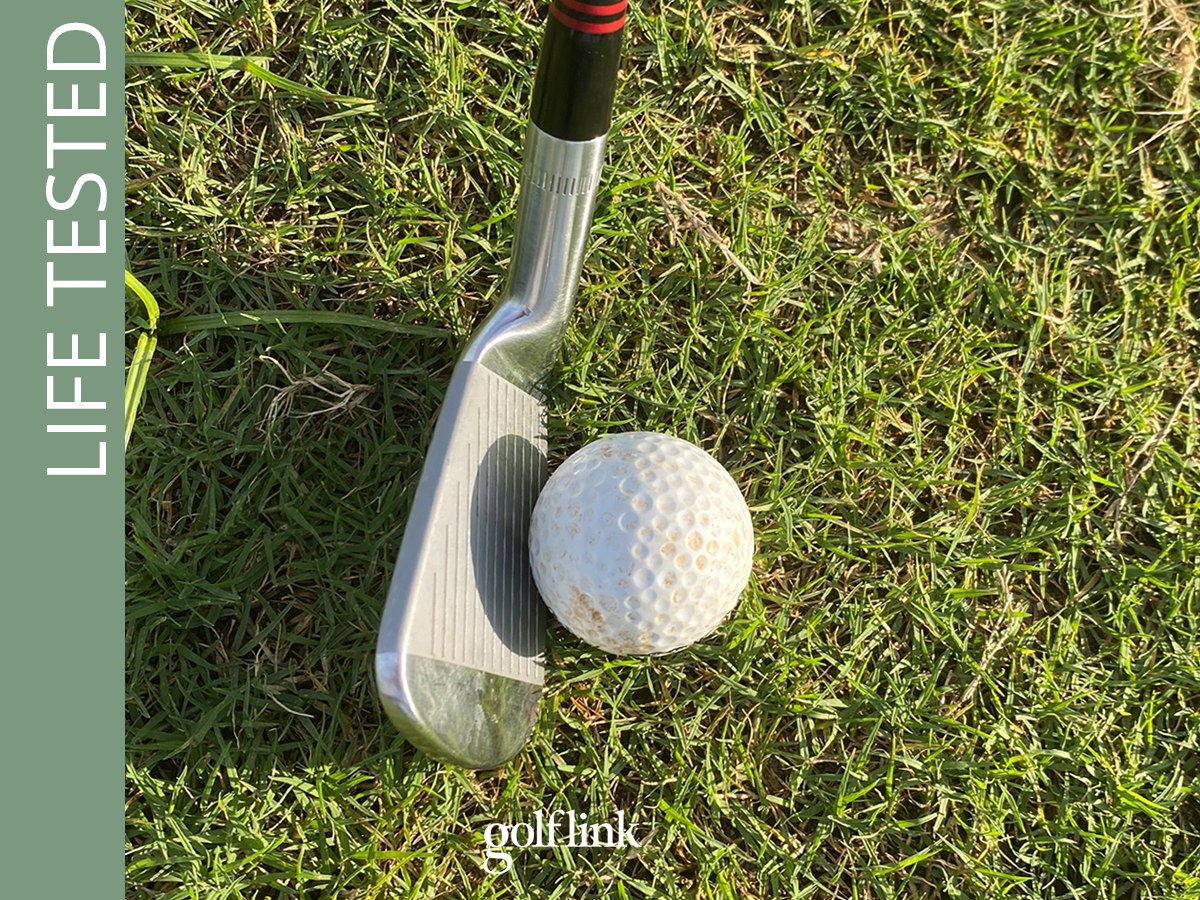
Put a good swing on these irons and you're going to like the results, all the way through the set. I found that they have a buttery feel, not only in the short irons, but the mid- and long irons as well.
Ben Hogan PTx Tour Iron Specs
|
Spec |
4 |
5 |
6 |
7 |
8 |
9 |
PW |
|
Loft |
21.5 |
25.5 |
29.5 |
33.5 |
37.5 |
41.5 |
45.5 |
|
Lie |
60 |
61 |
62 |
62.5 |
63 |
63.5 |
64 |
|
Length |
39.00 |
38.25 |
37.50 |
37.00 |
36.50 |
36.00 |
35.75 |